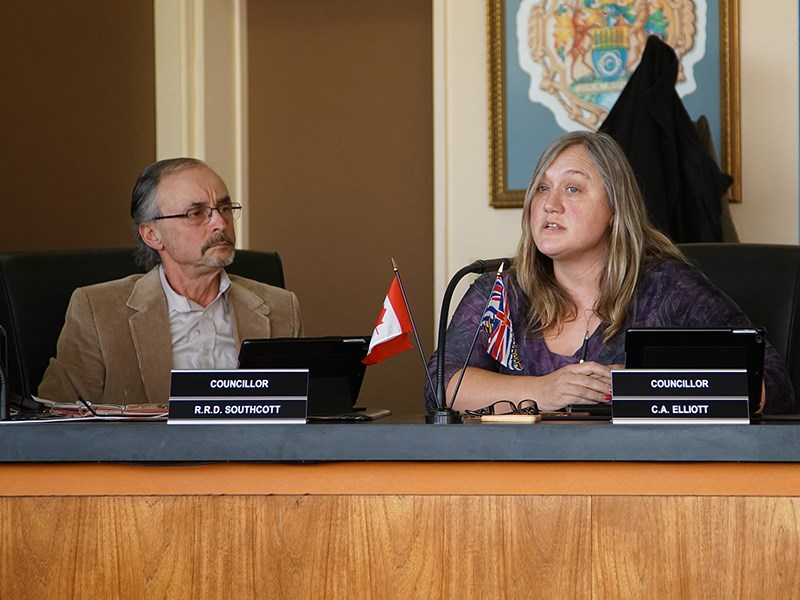City of Powell River Council’s committee of the whole was divided on how to respond to an email requesting that the city vote for a resolution to stand in solidarity with Wet’suwet’en hereditary chiefs.
At the committee’s meeting on Tuesday, February 18, councillors reviewed the email from resident Megan Cole, who requested the city pass a resolution declaring solidarity with the Wet’suwet’en, stating that the city calls on the governments of BC and Canada to end the forced removal of Wet’suwet’en people from their traditional territories, and the coercive force against Wet’suwet’en people seeking to prevent construction of the Coastal GasLink pipeline through non-violent methods.
Councillor Rob Southcott said after a lot of thought, he suggested a declaration that the city declare its commitment to dialogue and communication in the spirit of the community accord it has with Tla’amin Nation.
Mayor Dave Formosa said his thoughts were somewhat different.
“This issue is very controversial,” said Formosa. “Members of the first nations in the area, the elected bodies are in support, whereby they want the jobs. They have 20 first nations that have signed on. The provincial government has gone to court and lost. The law says to move forward.
“I don’t think it’s our place. It’s not something for our council to weigh in on. I suggest we just receive the letter.”
Councillor Cindy Elliott said her father is a member of the Gitxsan Nation. She said the Gitxsan, along with the Wet’suwet’en hereditary chiefs, went to court in a 20-year-long case. She said what they won in that court case was with the House of Delgamuukw, which deals with aboriginal title.
Elliott said one of the rules of engagement won by the house chiefs of the Gitxsan and Wet’suwet’en territory, they won for all aboriginal people, not just themselves, and that was the right to consultation.
“That right to consultation cannot and should not be overruled by any other person,” said Elliott. “The issue about elected representatives versus non-elected representatives is completely irrelevant in this case. The Unist’ot’en house of the Wet’suwet’en First Nation has the right to be consulted and represent themselves and that right cannot be superseded by anyone else.”
Elliott said the hereditary chiefs of the Unist’ot’en won that right in the courts and it is protected by the constitution.
“I don’t think running around at gunpoint and sending people to jail is the correct way to implement the constitution,” said Elliott. “Whether we as the City of Powell River have a statement to say about that or not, all of the things I’ve said today are true.”
Councillor George Doubt said he doesn’t think this city council is in a position to make a determination for the Wet’suwet’en people about the hierarchy in their government. He said he didn’t think councillors were in a position to make a decision about how the elected and hereditary representatives stack up against each other.
“We are better off to receive this letter for information and hope that discussion and real reconciliation happen,” he added.
Doubt moved that the committee receive the letter for information.
Southcott said councillors are leaders and he truly believes in leadership that comes from the local government.
“Our level of government shapes people every day,” said Southcott. “What I have suggested is we make an expression of leadership. We can do that and I think there is no other way but through dialogue and communication to solve any of these kinds of issues.”
Councillor Maggie Hathaway said she was confused about what council was being asked to support.
“The Wet’suwet’en themselves are divided,” said Hathaway. “Probably, the citizens of Powell River have some sort of equal division as well. I don’t feel confident to speak on behalf of the entire population of Powell River. I will continue to follow the issue, as I’m sure everyone else is, but I don’t feel I’m in a place where it’s our responsibility or competency to make any kind of declaration at all.”
Elliott said she did not think it was about the Wet’suwet’en being divided. This was about whether the House of the Wet’suwet’en deserves to be consulted, she said.
Councillor Jim Palm, who chaired the meeting, said this is a much bigger issue than the region of Powell River is going to deal with. He said he agreed with Doubt’s motion that the letter be received and letting the process play out.
“It does not need to be in our realm and dividing us,” said Palm.
Councillors Doubt, Palm, Hathaway and mayor Formosa voted in favour of receiving the letter, with councillors Elliott, Southcott and CaroleAnn Leishman opposed.
After the meeting, Elliott said the Wet’suwet’en Nation governance structure is not what Canadians are used to.
“Within the Unist’ot’en territory, it isn’t the Wet’suwet’en who have a right to be consulted, but rather, the Unist’ot’en house group,” said Elliott. “The law, the government and the media don’t seem to understand the difference. So yes, it’s about respect for Wet’suwet’en Nation, but in this particular case, respect for the Wet’suwet’en means consultation with the House of the Unist’ot’en specifically. Anything short of this is simply not right.”



